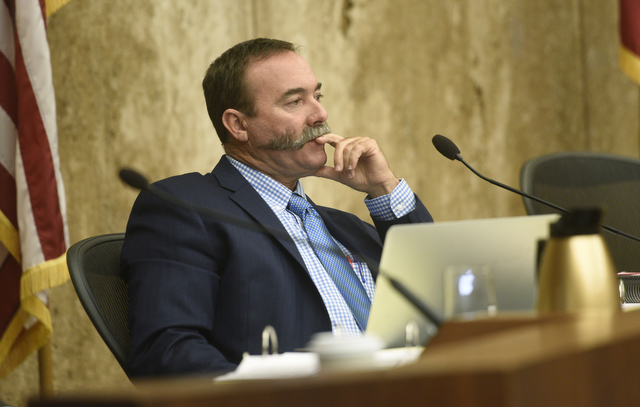Supervisor Adam Questions County’s Contract with Methadone Clinic
Convenes Hearing on Aegis Treatment Centers

Last week, Supervisor Peter Adam called for a hearing on the county’s contract with the methadone clinic Aegis Treatment Centers, after realizing “this is not what I previously understood was the theory of the program.” The contract renewal — which is reimbursed by Medi-Cal — is for up to $3.6 million.
“Some information has come to light for me that causes me some concern and I need to be convinced that this contract is in the best interest of our county,” said Adam, the most outspoken conservative on the Board of Supervisors.
It is not a question of whether or not the county should provide methadone, a controlled substance used to treat pain or to alleviate withdrawal symptoms in patients addicted to opioids. “We can’t deny anyone methadone,” said John Doyel, the county’s Alcohol and Drug guru. “That’s against the law.”
But the county can choose the provider. Aegis is the biggest such company in California; a few others, like Pacific Western Systems, exist in Ventura.
“I’ve been told that people may be on this treatment as if they had diabetes for the rest of their lives,” Adam said. “This is not what I previously understood was the theory behind the program and I’m guessing that my colleagues weren’t thinking that this was the case either…”
Bob Nelson, Adam’s chief of staff, explained their office has heard complaints from business owners about people who are high on methadone hanging around outside of the methadone clinic in Santa Maria. Second, Nelson said, they heard from people in child welfare services about cases of parents high on methadone. “This is outside of our area of expertise,” he said. “We are studying up on it…We definitely need to know more if we are approving more.”
The questions Adam sent to the county’s Behavior Wellness department include: How many clients are served per week? How long do clients stay in the program? Do they regularly reduce dosage? How does Aegis get paid?
At the heart of the questions is: Does this stuff work? And, furthermore, why would someone be on methadone for a lifetime? “These are good questions,” Doyel said. “We must always justify our existence in this field.”
That said, methadone is one of the most successful treatments out there, according to Doyel. “It takes cravings away. It helps heal the brain,” he said. “People don’t go out and do other drugs when they are on it.”
Most of Aegis’s patients, Doyel explained, are voluntary. They take the treatment daily in liquid form. Ninety percent are heroin addicts. Of those, 30-40 percent got addicted to opioids on prescription painkillers but likely switched to heroin because it is cheaper. According to police sources, black tar heroin costs $1,000 an ounce on the street in southern California.
“Opioids are the best high and the worst withdrawal. It’s the God and the anti-Christ wrapped up together,” Doyel said. “When a line is crossed and people can’t stop using, it’s a disease. It’s a brain disease.
“If you look at methadone — what’s the difference between that and Lipitor for cholesterol?” he asked. Some people do stay on methadone for a lifetime. “Does that mean people can’t get off opioids?” he asked. “Of course they can.”
Ultimately, the goal is always to get people off every drug, Doyel said. But methadone falls into the harm reduction model, not the abstinence model. “Methadone is abstinence off of other drugs,” he said.
Before returning to the Board of Supervisors, Behavior Wellness staff will compile data to see if Aegis clients’ lives have improved in specific areas. The hearing is expected to take place in the next month or so.


